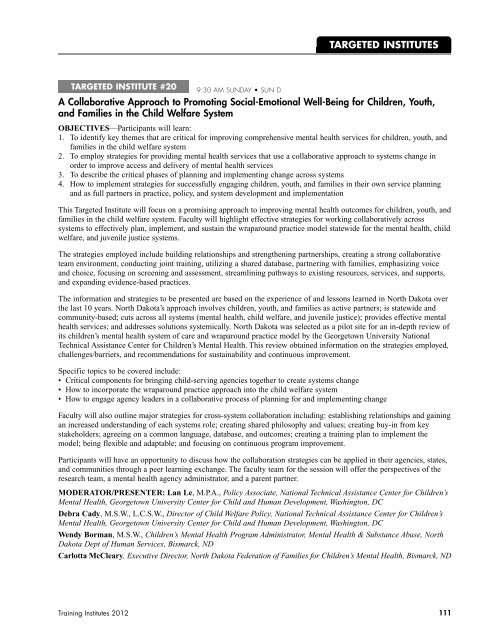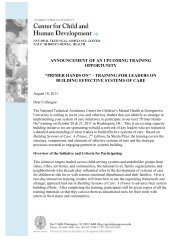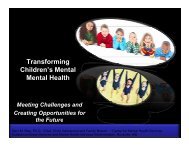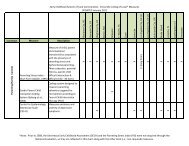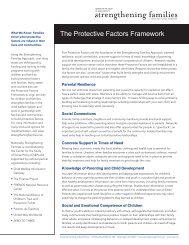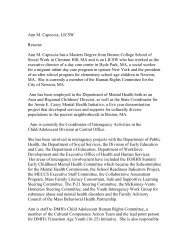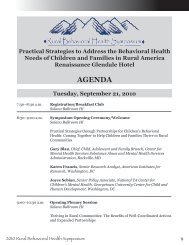Training Institutes 2012 - National Technical Assistance Center for ...
Training Institutes 2012 - National Technical Assistance Center for ...
Training Institutes 2012 - National Technical Assistance Center for ...
Create successful ePaper yourself
Turn your PDF publications into a flip-book with our unique Google optimized e-Paper software.
TARGETED INSTITUTE #20 9:30 AM SUNDAY • SUN D<br />
A Collaborative Approach to Promoting Social-Emotional Well-Being <strong>for</strong> Children, Youth,<br />
and Families in the Child Welfare System<br />
OBJECTIVES—Participants will learn:<br />
1. To identify key themes that are critical <strong>for</strong> improving comprehensive mental health services <strong>for</strong> children, youth, and<br />
families in the child welfare system<br />
2. To employ strategies <strong>for</strong> providing mental health services that use a collaborative approach to systems change in<br />
order to improve access and delivery of mental health services<br />
3. To describe the critical phases of planning and implementing change across systems<br />
4. How to implement strategies <strong>for</strong> successfully engaging children, youth, and families in their own service planning<br />
and as full partners in practice, policy, and system development and implementation<br />
This Targeted Institute will focus on a promising approach to improving mental health outcomes <strong>for</strong> children, youth, and<br />
families in the child welfare system. Faculty will highlight effective strategies <strong>for</strong> working collaboratively across<br />
systems to effectively plan, implement, and sustain the wraparound practice model statewide <strong>for</strong> the mental health, child<br />
welfare, and juvenile justice systems.<br />
The strategies employed include building relationships and strengthening partnerships, creating a strong collaborative<br />
team environment, conducting joint training, utilizing a shared database, partnering with families, emphasizing voice<br />
and choice, focusing on screening and assessment, streamlining pathways to existing resources, services, and supports,<br />
and expanding evidence-based practices.<br />
The in<strong>for</strong>mation and strategies to be presented are based on the experience of and lessons learned in North Dakota over<br />
the last 10 years. North Dakota’s approach involves children, youth, and families as active partners; is statewide and<br />
community-based; cuts across all systems (mental health, child welfare, and juvenile justice); provides effective mental<br />
health services; and addresses solutions systemically. North Dakota was selected as a pilot site <strong>for</strong> an in-depth review of<br />
its children’s mental health system of care and wraparound practice model by the Georgetown University <strong>National</strong><br />
<strong>Technical</strong> <strong>Assistance</strong> <strong>Center</strong> <strong>for</strong> Children’s Mental Health. This review obtained in<strong>for</strong>mation on the strategies employed,<br />
challenges/barriers, and recommendations <strong>for</strong> sustainability and continuous improvement.<br />
Specific topics to be covered include:<br />
• Critical components <strong>for</strong> bringing child-serving agencies together to create systems change<br />
• How to incorporate the wraparound practice approach into the child welfare system<br />
• How to engage agency leaders in a collaborative process of planning <strong>for</strong> and implementing change<br />
Faculty will also outline major strategies <strong>for</strong> cross-system collaboration including: establishing relationships and gaining<br />
an increased understanding of each systems role; creating shared philosophy and values; creating buy-in from key<br />
stakeholders; agreeing on a common language, database, and outcomes; creating a training plan to implement the<br />
model; being flexible and adaptable; and focusing on continuous program improvement.<br />
Participants will have an opportunity to discuss how the collaboration strategies can be applied in their agencies, states,<br />
and communities through a peer learning exchange. The faculty team <strong>for</strong> the session will offer the perspectives of the<br />
research team, a mental health agency administrator, and a parent partner.<br />
MODERATOR/PRESENTER: Lan Le, M.P.A., Policy Associate, <strong>National</strong> <strong>Technical</strong> <strong>Assistance</strong> <strong>Center</strong> <strong>for</strong> Children’s<br />
Mental Health, Georgetown University <strong>Center</strong> <strong>for</strong> Child and Human Development, Washington, DC<br />
Debra Cady, M.S.W., L.C.S.W., Director of Child Welfare Policy, <strong>National</strong> <strong>Technical</strong> <strong>Assistance</strong> <strong>Center</strong> <strong>for</strong> Children’s<br />
Mental Health, Georgetown University <strong>Center</strong> <strong>for</strong> Child and Human Development, Washington, DC<br />
Wendy Borman, M.S.W., Children’s Mental Health Program Administrator, Mental Health & Substance Abuse, North<br />
Dakota Dept of Human Services, Bismarck, ND<br />
Carlotta McCleary, Executive Director, North Dakota Federation of Families <strong>for</strong> Children’s Mental Health, Bismarck, ND<br />
<strong>Training</strong> <strong>Institutes</strong> <strong>2012</strong><br />
TARGETED INSTITUTES<br />
111


